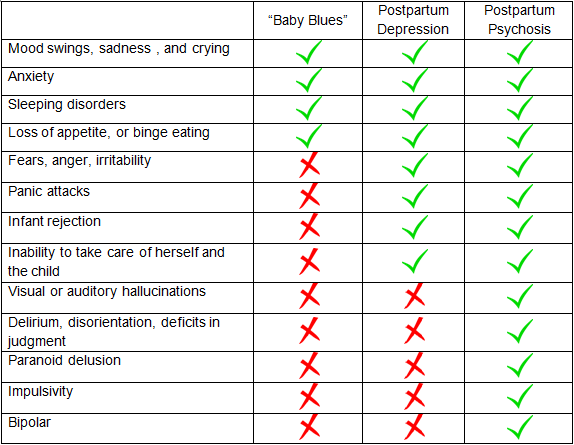- Postpartum psychological disorders include mild conditions, known as “baby blues,” postpartum depression, and postpartum psychosis.
- The risks of complications increase due to the history of psychological disorders, labor complications, unintended pregnancy, unmarried status, or marital discord (Perry & Hockenberry, 2018).
- Postpartum psychosis requires significant attention as “infanticide and suicide are observed in 4% and 5% of the women suffering from PP , respectively” (Sharma, Rai & Pathak, 2015, p. 216). Therefore, it is of utmost importance to scan for the symptoms of postpartum depression, as it poses a threat to the life and well-being of a mother and a newborn baby.

Onset and Duration
- “Baby Blues”
- Onset right after the birth.
- Resolves in several days.
- Postpartum Depression
- Within 4 weeks of childbirth.
- Up to 1 year postpartum.
- Postpartum
- Psychosis
- Within 1 month postpartum.
- Up to second year postpartum when untreated.
Medical Treatment
“Baby Blues”
- The condition resolves by itself.
Postpartum Depression
- Mild cases can resolve naturally over 6 months;
- Pharmacologic intervention: antidepressants, mood stabilizers, anti-anxiety agents.
- Electroconvulsive therapy (ECT).
- Alternative therapies: dietary supplements, aromatherapy, massage, acupuncture.
- Psychotherapy.
- Support groups.
- Hospitalization in the most severe cases.
Postpartum Psychosis
- In-hospital treatment is strongly recommended;
- Pharmacologic intervention: mood stabilizers, antidepressants – with caution.
- Electroconvulsive therapy (ECT).
- Psychotherapy after an acute phase.
Nursing Care
“Baby Blues”
- Observation and screening for more severe complications is needed.
- Educate parents and family members to recognize symptoms.
Postpartum Depression
- Request a mental health consult before discharge in case of concerns.
- Supervision of the mother: routine visits, phone calls.
- Screening for suicide thoughts.
- Referral to a mental health practitioner.
- Patient and family member education about pharmacological treatment and lactation.
Postpartum Psychosis
- Administer pharmacological treatment as prescribed.
- Administer reintroduction to the baby.
- Assess for the severe side effects of psychotropic medications.
- Patient and family member education about pharmacological treatment and lactation.
References
Perry, S. E., & Hockenberry, M. J. (2018). Maternal child nursing care (6th ed.). St. Louis, MO: Elsevier.
Sharma, I., Rai, S., & Pathak, A. (2015). Postpartum psychiatric disorders: Early diagnosis and management. Indian Journal of Psychiatry, 57(6), 216.